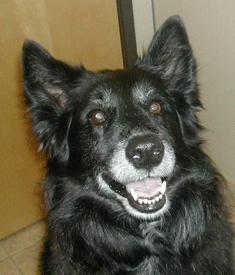Tending The Wind
An Introduction to Veterinary Holistic Medicine
Apr 07. Case Study (Bette Noire): Herbs
Bête Noire
FS Border Collie Mix / DOB April 1996
Bête was diagnosed in June 2002 with severe chronic hepatitis.
Symptoms: Vomiting, fever, and a bloated abdomen.
Bloodwork: ALP 308 (10-150), ALT 869 (5-60), AST 592 (5-55).
Abdominal US: Small moderately hypoechoic liver, with moderate to severe abdominal effusion.
Liver FNBx: Severe chronic hepatitis with moderate to severe cellular dysplasia and fibrosis, most likely due to a chronic idiopathic immune-mediated hepatitis; the presence of dysplasia and fibrosis suggested a likely progression to cirrhosis. Fluid cytology: modified transudate likely due to liver disease.
Prognosis: Guarded at best.
 Bête’s people decided not to pursue conventional therapy. By the end of June her ALT and AST had come down (243 and 41 respectively) but had gone up again by mid-July (477 and 219 respectively). Her first CAVM consult was on July 26, 2002 at which time a Chinese herbal formula was started, Xiao Yao San* (2g powder BID), along with a whole-foods antioxidant supplement and an initial round of acupuncture treatments. By July 31 her ALT was 114, and AST was 27. By September 19 her liver values were all normal, and in October her herb was reduced to 1g BID. Bloodwork remained normal until January 2004, when Bête experienced reduced appetite and bloating; her ALP was 240, ALT was 398, and AST was 160. After a few more sessions of acupuncture and an increase in her Xiao Yao San back to 2g BID, her bloodwork returned to normal. In March 2004 her usual prescription hypoallergenic diet was changed to an OTC brand and Bête developed bloating again; bloodwork revealed a high lipase and high triglycerides; this resolved with a return to her previous diet. Her ALP rose again in June 2006, and by September 2006 her ALP was 263, ALT 320, and AST 115, with a high Glob 3.9; Bête’s appetite had also decreased. Western herbs for liver cleansing/detoxing were prescribed September 15 for three weeks; recheck bloodwork mid-October showed ALP 150 and normal ALT and AST. By November all values were back to normal, and Bête continues to thrive.
Bête’s people decided not to pursue conventional therapy. By the end of June her ALT and AST had come down (243 and 41 respectively) but had gone up again by mid-July (477 and 219 respectively). Her first CAVM consult was on July 26, 2002 at which time a Chinese herbal formula was started, Xiao Yao San* (2g powder BID), along with a whole-foods antioxidant supplement and an initial round of acupuncture treatments. By July 31 her ALT was 114, and AST was 27. By September 19 her liver values were all normal, and in October her herb was reduced to 1g BID. Bloodwork remained normal until January 2004, when Bête experienced reduced appetite and bloating; her ALP was 240, ALT was 398, and AST was 160. After a few more sessions of acupuncture and an increase in her Xiao Yao San back to 2g BID, her bloodwork returned to normal. In March 2004 her usual prescription hypoallergenic diet was changed to an OTC brand and Bête developed bloating again; bloodwork revealed a high lipase and high triglycerides; this resolved with a return to her previous diet. Her ALP rose again in June 2006, and by September 2006 her ALP was 263, ALT 320, and AST 115, with a high Glob 3.9; Bête’s appetite had also decreased. Western herbs for liver cleansing/detoxing were prescribed September 15 for three weeks; recheck bloodwork mid-October showed ALP 150 and normal ALT and AST. By November all values were back to normal, and Bête continues to thrive.
*Xiao Yao San - the Chinese characters literally translate to “Carefree Powder” referring to one of the liver’s primary functions in Chinese medicine: the smooth, relaxed, and even flow of all the body’s energies and substances, including the emotions. When the liver is constrained it cannot perform this function (which leads to symptoms like hypochondriac pain). Liver constraint leads to disturbances in digestion (with decreased appetite and vomiting), which results in malnourishment and further constraint. This formula includes eight herbs. The chief herb, chai hu (bupleurum), relieves liver constraint. Two deputy herbs, dang gui (angelica) and bai shao (peony), nourish the blood and improve blood flow. The remaining assistants and envoys act to improve digestion, reduce abdominal pain, prevent vomiting, and reduce the heat arising from constraint.